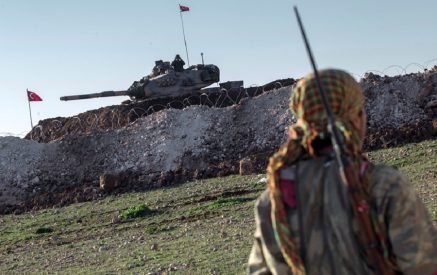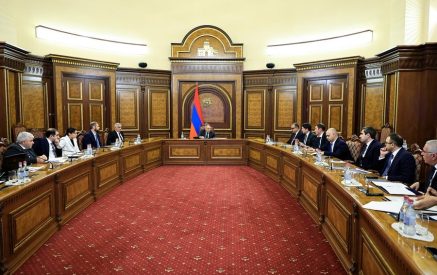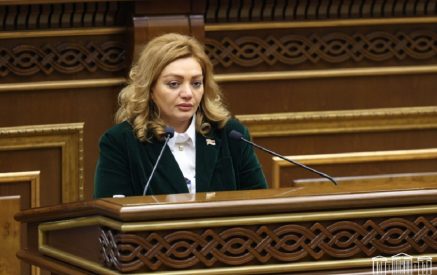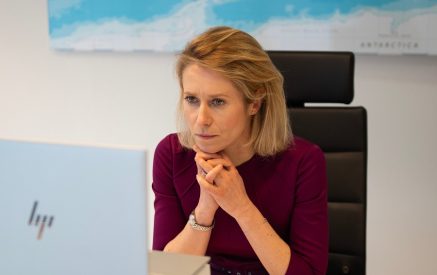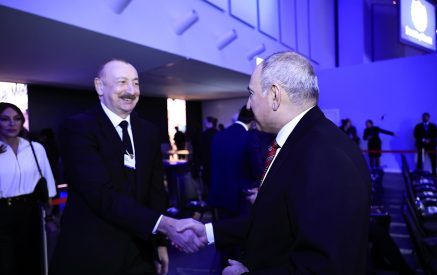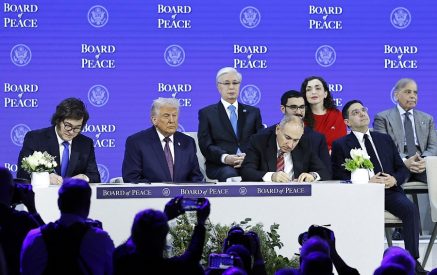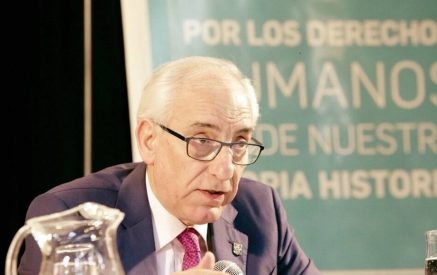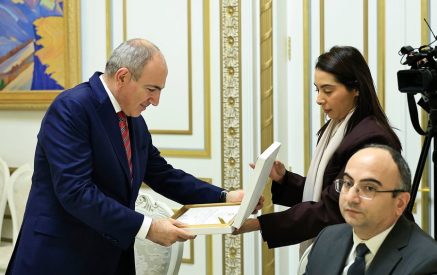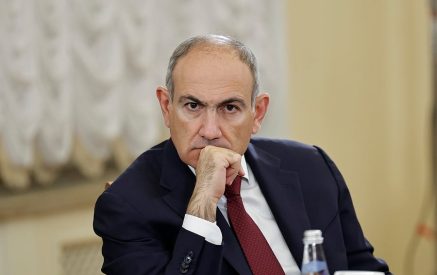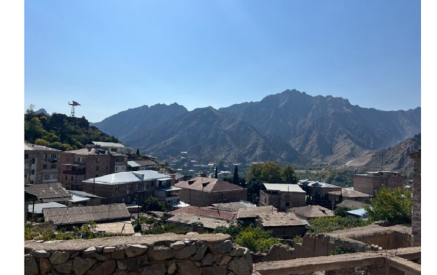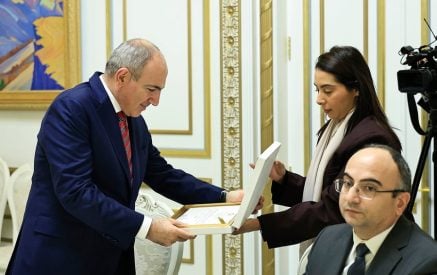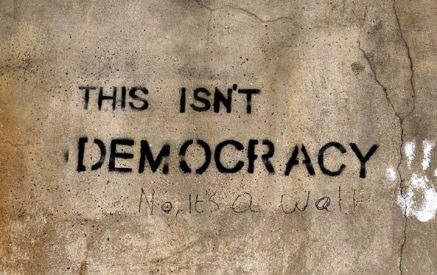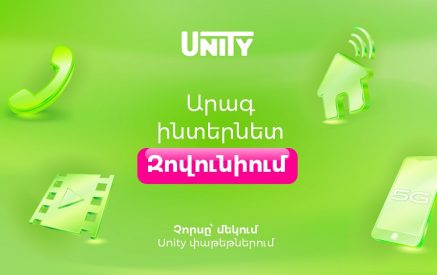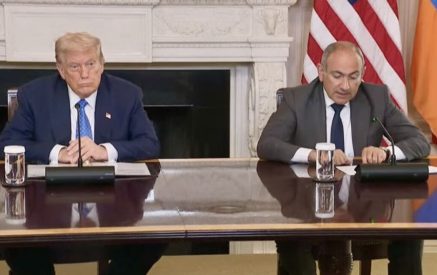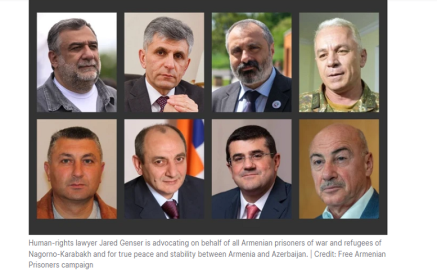Armenia’s Foreign Policy Challenges Impacting National Security and Continued Socio-Economic Development Must Include the Security of Artsakh’s Complete Borders and the Permanency of its independence.
BY GARO R. MADENLIAN
Foreign policy and diplomacy are critical components to Armenia’s national security and socio-economic development; such decisions and alliances, or posturing, can have huge consequences on Armenia and Artsakh as both have not yet become completely independent. In fact, complete independence is more difficult today with the ever-growing international globalist agenda.
Armenia’s primary challenge will be to ensure the safety and security of all the Armenians in the region while delivering on the promises of a brighter future as part of a movement that has instilled a positive outlook in many of its residents, specifically the youth; A brighter future with socio-economic development improving the quality of life and reducing emigration, having open and free & fair elections at all levels, eliminating corruption and not just taxing the corrupt, with equality for all residents, rule of law, and transparency throughout. A hope that cannot be allowed to fail once yet again as it’s failure can have devastating consequences for the country, most importantly on the psyche of its youth.
In this somewhat euphoric state, this “New Armenia” will have to take a long hard look at its foreign policy agenda and balance these two sometimes competing priorities: specifically, national security concerns including the security of its and Artsakh’s borders and thus the safety of the Armenian population in the region, versus economic development and trade to improve the quality of life its residents.
National Security Concerns
This should be the primary agenda item considering that Armenia is a small landlocked country with security concerns almost along its entire border, flanked by enemies to its east and west where both borders remain closed and where a “frozen war” exists with Azerbaijan; a country which regularly violates cease fire agreements creating a powder keg-like situation with the potential of erupting into a full scale war as in 2016 when Azerbaijani armed forces launched a military offensive along the entire line of contact with Artsakh.
Turkey, to Armenia’s west, committed the Armenian Genocide as part of its plan to create a pan-Turkic empire stretching across to Azerbaijan and east of the Caspian, with Armenia being the only non-Turkic/non-Muslim country in its way. Turkey’s border with Armenia remains closed since 1991 to strangle Armenia in support of Azerbaijan’s war against Artsakh (and Armenia), and to stifle Armenia’s legitimate claims of reparations (including demands to liberate Western Armenia) as a result of the genocide, with the goal of eventually removing Armenia and Armenians as the only obstacle to Turkey’s ongoing dream of creating a greater pan-Turkic empire.
Meanwhile, Azerbaijan, to Armenia’s east, has announced on numerous occasions that Karabagh, and even Yerevan, are historic Azerbaijani lands even though Azerbaijan came into existence as a country during recent modern history while Armenians celebrated the 2800th anniversary of the city of Yerevan. The Azerbaijani president has stated on numerous occasions that he is prepared to go to war as they did in 2016, and they of course, have Turkey’s full support.
In sum, Armenia and Artsakh have a combined population of approximately 3 million, less than a third of the population of Azerbaijan which has been amassing modern weapons over the past years from numerous sources including Turkey, Belarus and Israel. Meanwhile, Turkey has one of the largest and most powerful armies in the entire region and a population well over 80 million.
In essence, the safety and security of the population of Armenia and Artsakh and the defense of their collective borders must be the Armenian government’s top priority, and the analysis should be calculated, pragmatic and without emotion, otherwise we may not have a country to continue to develop, or even a population whose quality of life we so desperately want to improve.
Primary in this analysis must be the security of Artsakh, its borders and population, because if Artsakh falls to Azerbaijan not only will there be thousands of Armenian casualties including innocent women and children as Azerbaijan has a long history of massacring civilians, but there is a real possibility that Armenia could be next.
The ARF has repeatedly stated this since 1988; long-time ARF/Armenian leader Unger Hrair Maroukhian said it best in the early 1990s when he proclaimed “Artsakh is our Stalingrad,” in explaining that Artsakh is the priority to secure the borders and save lives, and because if Artsakh falls, then so too can Armenia; yet if Artsakh is liberated, developed and secure, then Armenia will also be protected. In addition, if the Armenian side concedes Artsakh or a portion thereof, or even considers returning historic Armenian lands then the entire Armenian struggle for justice from Artsakh to Javakhk and Nakhichevan all the way to Western Armenia will be at risk of being placed on the chopping block, up for negotiations. Something which is in Turkey’s intrest and a bright line that no Armenians should cross.
Thus, Armenia’s national security and national interests, and the Armenian struggle for justice, are all contingent upon Artsakh, and that has rightfully remained the ARF’s priority, sometimes even to the detriment of its other programs or even its reputation.
Armenia should also continue to realize that it needs a partner in the region to assist in the defense of its and Artsakh’s borders and secure the safety of the collective Armenian population, or at the very least to make sure Turkey, or others, do not intervene militarily on the side of Azerbaijan which seems prepared to launch a military offensive at any time.
Russia has been fulfilling this role ever since Armenia declared independence again in 1991, formalized by Armenia’s membership in the Collective Security and Treaty Organization (CSTO), a military alliance led by Russia which is still in force today and includes a large Russian military presence in Armenia stationed along the Armenia-Turkey border. Russia’s military dominance in the region also allows it to be a balancing factor/force in the region, especially with regards to Artsakh and keeping Turkey at bay. Thus, Armenia’s government needs to maintain excellent and close relations with Russia, if for nothing else then for the defense of its borders and protection of Armenians living in the region.
The alternative would be to revert to a dangerous state similar to when Armenia’s first president, Levon Ter Petrosian snubbed his nose at Russia while attempting to cozy up to the “west.” This cost countless Armenian lives in Artsakh and the entire Shahumian region along with large portions of Mardagert and Hadrut when Russia assisted the Azerbaijani armed forces and mercenary groups it employed; Armenians later liberated the Mardagert and Hadrut regions, however Azerbaijan continues to occupy the entire Shahumian region today. Similar if not more devastating outcomes resulted directly from Russia’s response to Georgia and Ukraine, when they broke from Russia both lost significant lives and land, Abkhazia and Crimea respectively.
Economic Development
However, Armenia must still take steps to improve socio-economic conditions and it unfortunately seems that economic development and growth will not improve quickly if it all, if it remains dependent on Russia as this partnership has not yielded tremendous results over the past thirty years. Even though many visiting Armenia and Artsakh will find bustling city centers, cafés and restaurants, a vibrant nightlife, cultural programs and development of the arts, most of the population continues to live in poverty unable to avail themselves of such pleasures, let alone to secure the necessities of daily life.
Thus, with the safety and security of its population being its paramount concern, and contingent upon Artsakh, Armenia must still find alternative means to improve its economy, and with that the lives of its population, and do so while maintaining close relations with Russia. In essence, gradually diversify its portfolio.
Complicating matters is the fact that Armenia is a member of the Eurasian Economic Union (EAEU) also led by Russia; to leave this union is to turn away from Russia, which at this juncture could leave Armenia and Artsakh militarily vulnerable depending on the Russian response. Furthermore, over the years the large scale selling of Armenia’s natural resources to Russian conglomerates, most likely under the threat of Russia halting its military cooperation with Armenia or even tipping the scales in Artsakh towards Azerbaijan, have added to the already existing difficulties Armenia faces with closed borders and threats of war, both of which make it extremely difficult for Armenia to improve economically on its own.
Geopolitical considerations make matters worse as Turkey is a member of NATO and traditionally an ally of the United States and Israel, although the relationships have been hot and cold during the past decade. Turkey’s closest ally in the region is Azerbaijan which has a long-standing history of cooperation with large western petroleum and oil companies who have either invested in and/or partnered with the Azerbaijani government for access to petroleum reserves along the Caspian Sea. In sum, the “west” is closely aligned with Turkey and Azerbaijan both militarily and economically. If not for the influence of the vast Armenian diaspora, where the ARF plays a pivotal role, western countries would more openly support Turkey and Azerbaijan against Armenia as that is where their military, economic, and regional interests lie.
Armenia’s only realistic avenues for direct trade are limited to Georgia to the north or Iran to the south. However, Georgia looks to the west, primarily the U.S., for guidance and support, and has an estranged relationship with Russia over Abkhazia among other things. While Iran has relatively close ties with Russia but has been subject to sanctions by the U.S. and thus the western world. Since Armenia should realize it needs to maintain close ties with Russia for national security concerns including Artsakh, then that effectively leaves the border with Iran as the only consistent and viable direct trade route.
The US also has its own agenda in the region and recently attempted to apply pressure to drive a wedge between Armenia and Russia with: 1). A one-two punch where the outgoing US Ambassador to Armenia stated that territorial concessions for peace, a long-standing US State Department policy regarding Artsakh, were inevitable… Followed by US National Security Advisor’s visit to Armenia with an offer to sell arms to Armenia under the threat of repealing Section 907 which bans arms sales to Azerbaijan; 2).Bank accounts of citizens of Armenia, who repatriated from Iran, found their bank accounts in Armenia frozen due to US sanctions against Iran; the ARF quickly demanded this situation be corrected, which thankfully was quickly remedied; 3). US State Department cautioned tourists visiting Armenia about possible terrorist activities when none exist and tourism significantly helps Armenia’s economy. The ANCA quickly refuted this, pointed out that no such terrorists are in Armenia as it is one of the safest countries to visit. Tourism, of course, is a huge source of revenue for Armenia…
Thus, Armenia must be careful to not place itself at the center of a proxy war between Russia and US as this in and of itself can have long lasting negative consequences for the region, as in Vietnam, Afghanistan, and Central America…
On a positive note, Armenia has had partnership agreements in place with the European Union (EU) for two decades expanding trade and relations gradually over that time. During the past few years Armenia has been slowly inching closer towards the EU and just last year in 2017 finalized the Comprehensive and Enhanced Partnership Agreement (CEPA) to broaden and deepen economic and political relations, taking the position that Armenia can be a bridge between the EU and the EAEU. An ambitious approach that should be further explored and continued by Armenia. The EU has stated numerous times in the past that Armenia may join the EU, however its membership in the EAEU is difficult to overcome.
Another option for Armenia to advance its economy and further develop trade is to look further east to the Shanghai Cooperation Organization (SCO) led by China that includes military, economic and cultural cooperation; three countries from the EAEU including Russia are member states and India and Pakistan joined last year. Armenia has been a dialogue partner since 2008 and applied for observer status in 2012. There have been discussions to merge the SCO with the CSTO, which is still being debated.
This may be another realistic option for Armenia as it includes Russia and others from the CSTO and EAEU. The SCO has the potential to help Armenia continue to improve its economic development by opening trade relations with countries in Asia consisting of vast populations while not offending the military and economic cooperation agreements with Russia in place as part of the CSTO and the EAEU.
Needless to say, this will be a huge challenge where the Armenian diaspora can play a key role in its implementation.
Conclusion
Artsakh remains the foundation for Armenia’s security, a prerequisite for its economic development, as well as the symbol of the ongoing Armenian struggle for justice leading to an eventual free, independent and united Armenia. Therefore, the potential for socio-economic development in Armenia must not come at the expense of Artsakh as that would place Armenia and the Armenian struggle at risk.
Armenia should continue to maintain close relations with Russia based on its national security needs to secure the safety of its and Artsakh’s population, defense of borders, and to ensure the permanency of their independence and continued improvement of socio-economic conditions of both republics.
However, Armenia should diversify its economic portfolio: continue to develop new cooperation agreements in addition to those currently in place with EAEU, Russia, EU and others; these will most likely include continuing on the same path, and also working with the SCO.
All this without offending the cooperation agreements in place, and without falling victim to the regional agenda of some to alienate Russia, which at this juncture could result in sacrificing Artsakh and the lives of our people there; something no Armenian should be willing to risk, and that we all agree and realize can lead to devastating consequences for Armenia and Armenians in the region and elsewhere.
Garo R. Madenlian is an attorney practicing in Southern California. He is a member of the ARF Western U.S. Central Committee.





